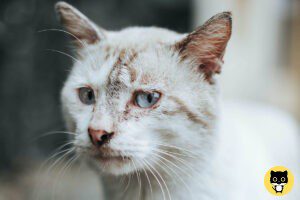Digestive problems are a common occurrence in cats and can be a cause of concern for pet owners. Cats may experience various gastrointestinal (GI) disorders, which can range from occasional upset stomach to chronic conditions. Recognizing the symptoms and understanding the causes of these issues are crucial for effective management and ensuring your cat’s overall health and well-being.
In this guide, we will delve into the world of cats’ gastrointestinal issues, exploring the common causes, symptoms, diagnosis, and treatment options available. We will provide insights into the various digestive disorders that cats may encounter, empowering you to better understand and address your feline companion’s digestive health.
Understanding Gastrointestinal Disorders in Cats
The gastrointestinal tract, comprising the stomach and intestines, plays a vital role in a cat’s digestion, nutrient absorption, and overall health. When this delicate system is disrupted, it can lead to discomfort, pain, and a range of clinical signs. Cats may exhibit symptoms such as vomiting, diarrhea, constipation, decreased appetite, weight loss, and abdominal pain when experiencing gastrointestinal issues.
Gastrointestinal disorders can be categorized into acute, with sudden and severe onset, or chronic, persisting or recurring over an extended period. These disorders can stem from a variety of causes, including infections, dietary indiscretions, stress, food allergies, parasites, and inflammatory conditions.
Recognizing the Symptoms of Gastrointestinal Issues
Identifying the symptoms of gastrointestinal issues in cats is crucial for early detection and treatment. While cats may not exhibit all symptoms at once, being aware of the common signs can help you gauge your cat’s well-being. Some of the key symptoms to look out for include:
- Vomiting: Cats may experience intermittent episodes of vomiting, often accompanied by the expulsion of foamy, yellowish bile.
- Diarrhea: Loose, frequent bowel movements, resembling soft-serve ice cream in consistency, may indicate gastrointestinal distress.
- Constipation: Difficulty in passing stools, dry and hard feces, and straining during defecation are common signs of constipation in cats.
- Decreased appetite: Cats with gastrointestinal issues may exhibit a loss of appetite or anorexia, leading to weight loss and malnutrition.
- Abdominal pain: Cats may show signs of discomfort when their abdomen is touched or handled, exhibiting tenderness or a hunched posture.
- Lethargy and behavior changes: Gastrointestinal problems can cause cats to become less active, lethargic, grumpy, or withdrawn.
- Dehydration: Persistent vomiting and diarrhea can lead to dehydration, characterized by sunken eyes, dry gums, and decreased skin elasticity.
Common Causes of Gastrointestinal Issues
Gastrointestinal issues in cats can arise from various factors, including infections, dietary indiscretions, stress, and underlying health conditions. Understanding the common causes can help you pinpoint the root of the problem and seek appropriate treatment. Some of the prevalent causes include:
- Dietary indiscretion: Consuming inappropriate or spoiled food, garbage, or foreign objects can lead to acute digestive disorders in cats.
- Food allergies: Cats may develop allergies to certain ingredients in their diet, leading to chronic digestive issues such as vomiting and diarrhea.
- Parasites: Intestinal parasites like roundworms, hookworms, and giardia can cause gastrointestinal distress, leading to vomiting and diarrhea.
- Stress: Significant changes in a cat’s environment, routine, or introduction of new animals or people can result in stress-induced digestive problems.
- Inflammatory bowel disease (IBD): This chronic condition involves inflammation of the gut wall, leading to symptoms like vomiting, diarrhea, and weight loss.
- Infectious agents: Viruses, bacteria, fungi, and parasites can cause gastroenteritis, resulting in vomiting, diarrhea, and abdominal pain.
- Pancreatitis: Inflammation of the pancreas can disrupt digestion, leading to symptoms such as vomiting, diarrhea, and decreased appetite.
Diagnosis of Gastrointestinal Issues
Diagnosing gastrointestinal issues in cats requires a thorough examination of their medical history, physical examination, and appropriate diagnostic tests. Your veterinarian will aim to rule out other potential causes and determine the underlying factors contributing to your cat’s digestive problems. Key diagnostic steps may include:
- Medical history: Providing detailed information about your cat’s diet, recent exposure to toxins, medications, and previous episodes of vomiting and diarrhea can help in diagnosis.
- Physical examination: Your veterinarian will conduct a comprehensive physical examination, assessing signs of dehydration, abdominal pain, tenderness, and other abnormalities.
- Diagnostic tests: Depending on the severity and duration of symptoms, diagnostic tests may include complete blood cell count (CBC), serum chemistries, fecal tests, urinalysis, abdominal radiographs, and ultrasound.
Treatment Approaches for Gastrointestinal Disorders
The treatment of gastrointestinal disorders in cats primarily focuses on rehydration, restoring electrolyte balance, and addressing the underlying causes of the issue. Treatment plans will be tailored to your cat’s specific condition and may include the following approaches:
- Fluid replacement: Rehydration is crucial for cats experiencing vomiting and diarrhea. Fluids may be administered orally, subcutaneously, or intravenously, depending on the level of dehydration.
- Medications: Antibiotics may be prescribed to treat bacterial infections, while anti-emetic or anti-vomiting medications can help alleviate nausea and vomiting. Gastrointestinal protectants may also be used to prevent stomach ulcers.
- Diet modifications: Your veterinarian may recommend withholding food temporarily and gradually reintroducing a highly digestible, low-fat, and low-fiber diet. Specialized diets for cats with specific gastrointestinal conditions may also be recommended.
- Addressing underlying conditions: If food allergies or inflammatory bowel disease are identified as the underlying cause, dietary changes and medications specific to these conditions may be prescribed.
- Supportive care: Providing a calm and stress-free environment, ensuring access to fresh water, and monitoring your cat’s progress are essential components of supportive care during treatment.
Prognosis and Follow-Up Care
Most cases of acute gastrointestinal issues in cats improve rapidly with appropriate treatment and supportive care. However, it is important to monitor your cat’s progress and contact your veterinarian if symptoms persist or worsen. Follow-up visits and further diagnostic tests may be necessary to ensure the underlying cause is adequately addressed. With proper management and ongoing veterinary care, the prognosis for cats with gastrointestinal disorders is generally favorable.
Prevention and Lifestyle Considerations
Preventing gastrointestinal issues in cats involves adopting certain lifestyle practices and being mindful of their dietary and environmental needs. Here are some preventive measures to consider:
- Provide a balanced diet: Feed your cat a nutritionally balanced diet, avoiding excessive treats or human food that can upset their digestive system.
- Gradual food transitions: When switching your cat’s diet, do so gradually over 1-2 weeks to allow their system to adjust and minimize digestive upset.
- Minimize stress: Create a calm and stable environment for your cat, minimizing major changes in routine or exposure to stressful situations.
- Regular veterinary check-ups: Schedule routine visits with your veterinarian to monitor your cat’s overall health, address any concerns promptly, and ensure proper vaccination and parasite prevention.
- Proper hydration: Ensure your cat has access to fresh water at all times to prevent dehydration and promote healthy digestion.
- Safe play and environment: Avoid giving your cat access to small objects, strings, or toxins that can be ingested and cause gastrointestinal obstructions or poisoning.
By implementing these preventive measures and maintaining open communication with your veterinarian, you can play an active role in promoting your cat’s digestive health and overall well-being.
Please register to leave a reply below and to post in the Forums.






